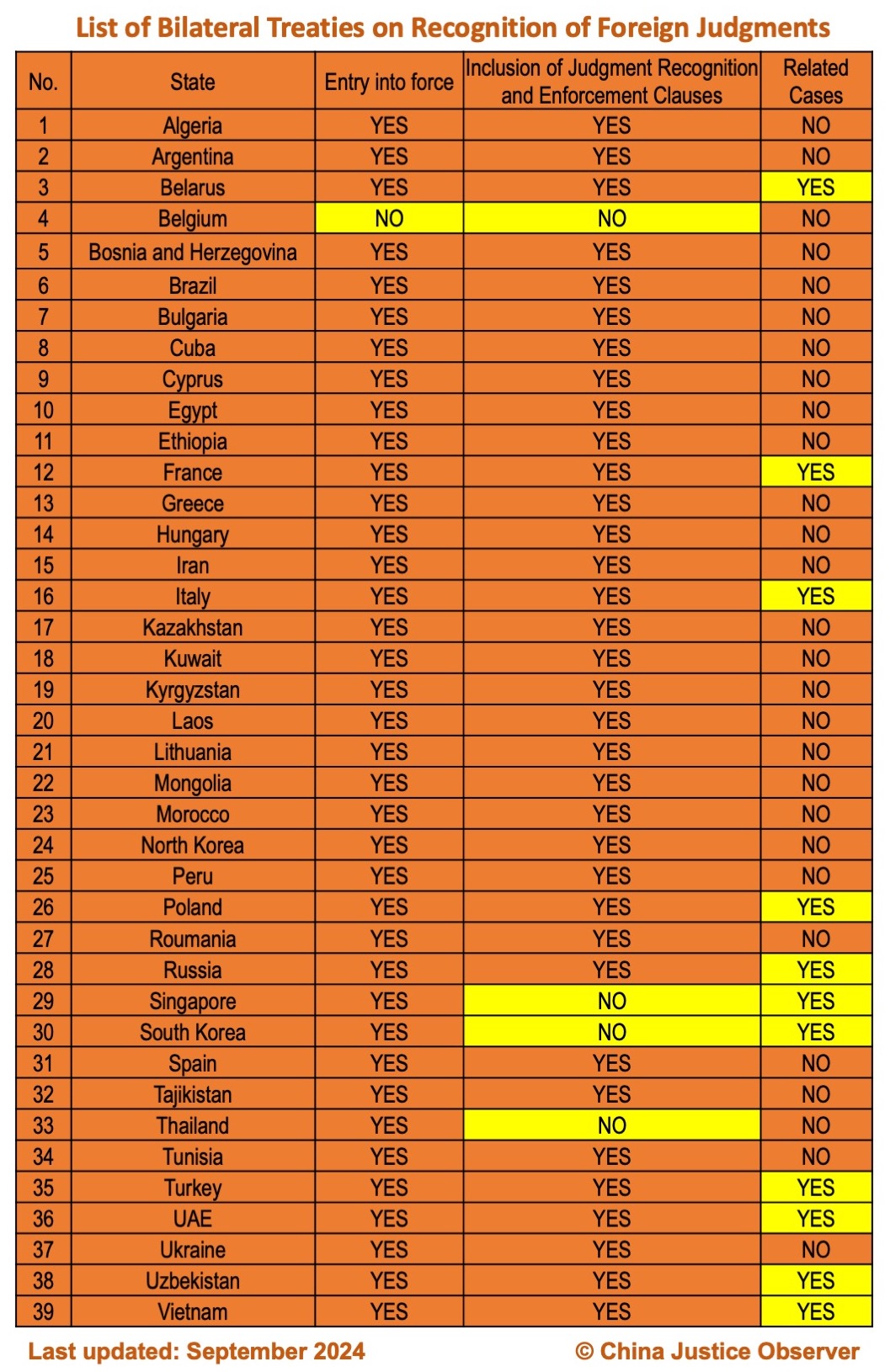On 22 September 2024, China Justice Observer released the 2024 version of the List of China’s Cases on Recognition of Foreign Judgments. To date, we have collected 109 cases involving China and 26 foreign States and regions. (Note: Foreign divorce judgments are excluded in the Case List.)
The key features of the updated list are:
- The List comprises 26 concise reports for each jurisdiction, together with a chart of bilateral judicial assistance treaties which China has concluded with 39 States, of which 35 bilateral treaties include judgment enforcement clauses.
- A total of eleven newly added cases involve one treaty jurisdiction - Russia (one case), and six non-treaty jurisdictions, namely, Australia (two cases), Canada (three cases), Japan (one case), Malaysia (one case), Singapore (two cases), and Thailand (one case).
- Please note that in Guangxi Nanning China Travel Service Co., Ltd. v. Orient Thai Airlines Co., Ltd. (2023) Gui 71 Xie Wai Ren No. 1, a local Chinese court in Nanning, Guangxi Province, ruled to recognize and enforce a Thai monetary judgment in 2024. Apart from being the first case of enforcing Thai monetary judgments in China, it is also the first publicly reported case confirming a reciprocal relationship based on “presumptive reciprocity”.
- Another noteworthy case is In re Shanghai International Corporation (2021) Hu 03 Xie Wai Ren No.1, where the Shanghai Third Intermediate People’s Court ruled to recognize the Tokyo District Court’s decision to commence civil rehabilitation proceedings and the order appointing the supervisor. This marks not only the first time that China has recognized a Japanese court's decision in a bankruptcy procedure, but also the first time that China has recognized a Japanese court judgment, signaling a potential shift in the traditionally strained mutual recognition landscape between China and Japan.
- Other newly added cases, be it foreign judgments to be enforced in China or Chinese judgments to be enforced in foreign jurisdictions, provide a valuable comparative perspective on key issues in the eyes of courts from different jurisdictions, such as the enforceability of Chinese civil settlement statements (also known as “civil mediation judgments”, cf. different views in Wei v. Li 2019 BCCA 114 (Canada) and Shi Wen Yue v Shi Minjiu & Anor [2016] SGHC 137 (Singapore) ), finality (Canada), proof of foreign judgments (Malaysia), due process in absentia judgments (Singapore, Russia ), procedural fairness/natural justice issues arising from alternative service of process (cf. Zhou v Jing [2023] NSWSC 214 (Australia), Yin v Wu [2023] VSCA 130 (Australia) ).
- Each case has been reviewed and more details, such as the grounds, the case numbers, and causes of action, have been added.
- Case analyses have been aggregated under the country tags since 2022, so it is now easier to track down relevant cases, together with their information and analyses, in each country/region report. For example, under the tag ‘US-China Judgments Recognition and Enforcement’, one can find relevant case analyses involving mutual recognition and enforcement of judgments between the US and China.
We would like to thank the following persons/institutions that shared thoughts and valuable information with us:
- Dr. Béligh Elbalti, Associate Professor, Graduate School of Law and Politics, Osaka University, Japan
- Dr. ZHANG Wenliang (張文亮), Associate Professor, School of Law, Renmin University of China
- Dr. SU Xiaoling(蘇曉凌), Lawyer at Beijing DHH Law Firm
- Mr. WANG Chengjie (王成杰), Lawyer at Allbright Law Offices (Shanghai)
- Wonbanglaw (萬邦法律)
- Ms. Renee M Wong, Attorney at Goldberger and Dubin PC (New York)
- Dr. WANG Yahan (王雅菡), Associate Professor, Henan University School of Law
- Mr. Angus Ni, Litigation attorney at AFN Law PLLC (Seattle)
- Asian Business Law Institute
- Ms. Dawei Gongsun, Partner at DGW Kramer LLP (New York)
As always, we endeavor to collect all Chinese court decisions involving the recognition and enforcement of foreign judgments (“REFJ”), and foreign counterparts concerning the recognition and enforcement of Chinese judgments. The Case List is made available for our readers to build reasonable expectations on REFJ in China.
The Case List is continually updated with new reports. Case information, comments, and suggestions are most welcome. Please feel free to contact Ms. Meng YU via e-mail at meng.yu@chinajusticeobserver.com.
For an overview of the disposition of cases on REFJ, please see the three tables below.
For information about bilateral judicial assistance treaties that China and 39 States have concluded, please see table 2 below.
(For the List of China's Bilateral Treaties on Judicial Assistance in Civil and Commercial Matters (Enforcement of Foreign Judgments Included), please click here. Authoritative texts in Chinese and other languages are now available.)

For the detailed country(region) report about cases on REFJ, please see the following charts.
Contributors: Guodong Du 杜國棟 , Meng Yu 余萌









